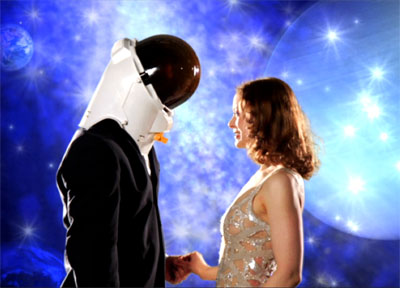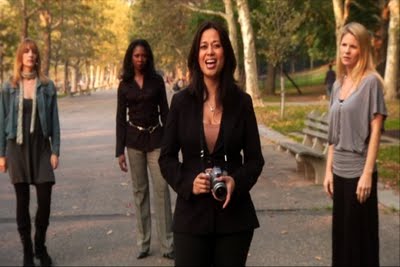Fri 3 Sep 2010
On A Tuesday You Can See Forever
Posted by Ethan under Film Review, NYC Film Critic
Comments Off on On A Tuesday You Can See Forever
Clear Blue Tuesday
Directed by Elizabeth Lucas
Starring Becca Ayers, Julie Danao-Salkin, Vedant Gokhale, Robi Hager, Erin Hill.
**
I hate to sound like a pessimist, but Elizabeth Lucas probably set herself up for failure with Clear Blue Tuesday, an indie movie musical that attempts to deal with the impact of September 11, 2001 on the lives of 11 New Yorkers. For the record, the film’s chief problem isn’t its choice of subject matter. While 9/11 may seem like an incongruous subject for a musical, I’m willing to bet that there’s a supremely talented composer out there who could find a way to effectively explore the events and feelings provoked by that day and its aftermath through song. (After all, until Stephen Sondheim came along, who would have guessed that a great musical could be mined from the subject of presidential assassinations?)
No, what gets Lucas into trouble is the film’s low budget, as well as her general inexperience directing a musical on film. Although her bio indicates that she has extensive experience directing for the stage, that background doesn’t automatically give one the skills required to make a great movie musical—just ask the Susan Stroman who tried and failed to preserve the magic of The Producers stage musical on the big screen. Many of the musical sequences in Clear Blue Tuesday are awkwardly staged—as if Lucas is never quite sure where to put the camera—and further marred by obvious lip-syncing and choppy editing.  No doubt many of these issues can be chalked up to the filmmakers’ limited resources; the movie was shot in 19 days for what was probably less than half of Moulin Rouge’s costume budget.
While most genres work just fine and, in some cases, are even enhanced by smaller budgets, musicals still require the kind of grand showmanship that only a healthy amount of cash can provide. The sole low-budget movie musical in recent memory that actually worked was the charming Irish ditty Once and there the director specifically designed the film to avoid the usual genre trappings, including elaborate song-and-dance routines on lavish sets. Lucas still wants to bring some of that Broadway zazz to Clear Blue Tuesday, but she doesn’t have the funds to pull it off convincingly. So instead you’re left with awkward, cheap-looking musical sequences like a strip-tease style number performed on the counter in a dive bar and another song that takes place in Ed Wood’s version of outer space, complete with paper mache planets suspended from strings and a performer dressed up in a homemade alien outfit.
Perhaps the most important thing a great movie musical requires, of course, is memorable music and that’s another area where Clear Blue Tuesday falls flat. Like Robert Altman in Nashville, Lucas had the actors write their own songs. This gambit succeeded in Nashville, with the cast penning distinctive, insightful songs that were both fun to listen to and revealed something about the character singing them. Here though, the tunes have a tendency to run together, particularly the slower ballads, which all sound like rejects from lite-FM radio stations. (It doesn’t help that the sound mix is problematic—it’s often difficult to hear the lyrics above the noise of a droning piano or screeching guitars.)
The film’s tepid songs are emblematic of its tepid characterizations. Lucas has stacked the cast with Broadway veterans and emerging singer-songwriters, but none of them manage to breath fresh life into their overly familiar roles. The roll call of characters includes the fresh-faced ingénue who arrives in the Big Apple with dreams of stardom (Cassandra Kubinski), the frustrated screenwriter who lost the love of his life in the Twin Towers (Jeremy Schonfeld), the unlucky-in-love geek whose best friends are her Star Trek action figures (Erin Hill), the up-and-coming lawyer who neglects his wife and friends in pursuit of a better title (Asa Somers) and the elderly woman still recovering from physical and emotional scars left by 9/11. None of the actors do anything wrong per se—for the most part, they are eminently watchable, although a few of them don’t seem entirely confident performing for the camera—but they don’t get the chance to do much right either. In an effort to give all 11 characters more or less equal screen time, Lucas rushes through their individual stories to the point where they feel less like real people than laundry lists of quirks and emotional issues. Still, I guess we should be thankful that she at least refrains from finding improbable ways to connect all these folks together a la Crash or Babel.
If none of the film’s human characters prove particularly interesting, Lucas is more successful at turning New York City into a compelling presence. Shooting on the streets and in real locations as much as possible, she captures some of the city’s diversity and energy. And for all the banal story points that the movie ticks off like clockwork, there are a few moments where some real, honest emotion breaks through. Significantly, these moments all arise when the music stops and the characters try (and sometimes fail) to express themselves in more conventional ways. It’s often said that one of the reasons people love musicals is because they supposedly allow people to confess things in song that they could never put into words. That’s certainly true of some musicals (think Kiss Me Kate, Chicago and the aforementioned Assassins) but in the case of Clear Blue Tuesday, the music too often distracts from the experience rather than enhancing it.   Â
Clear Blue Tuesday opens in New York City today. Visit the film’s official website for more information.





No Responses to “ On A Tuesday You Can See Forever ”
Sorry, comments for this entry are closed at this time.